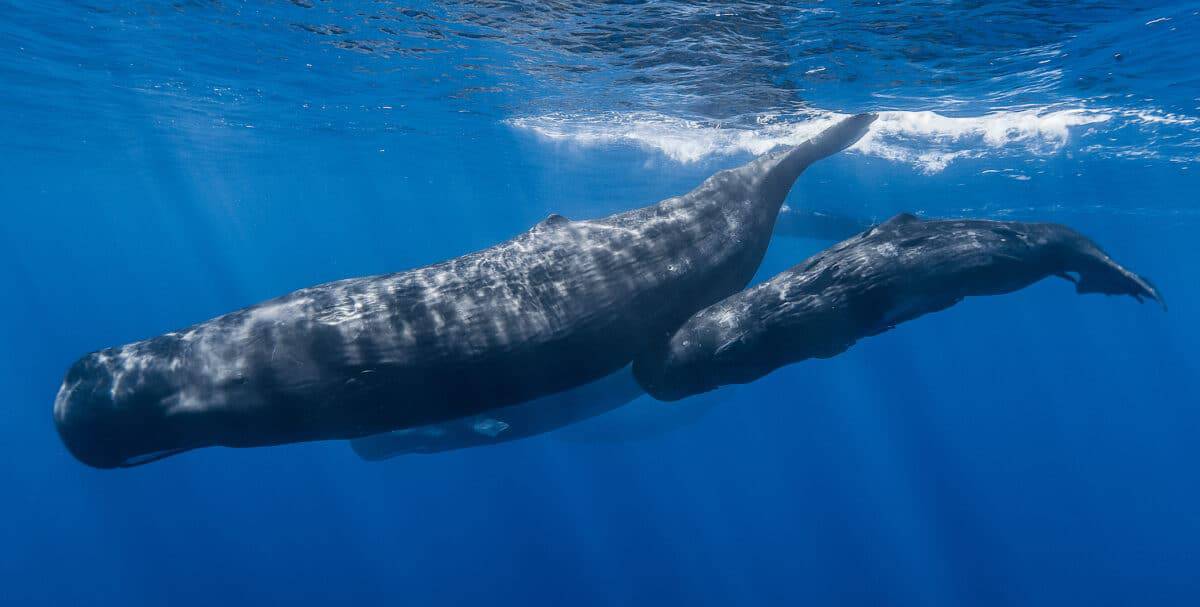In a groundbreaking move, the Caribbean jewel, Dominica, has set the stage for global conservation efforts by establishing the world’s first marine protected area exclusively dedicated to the preservation of the endangered sperm whale. Spanning nearly 300 square miles (800 square kilometers) of the azure waters on the western flank of this idyllic island, the reserve serves as a vital sanctuary, safeguarding crucial nursing and feeding grounds for these majestic marine giants.
Dominican Commitment to Conservation
Dominica‘s Prime Minister, Roosevelt Skerrit, declared on Monday the government’s unwavering commitment to the cause. We want to ensure these majestic and highly intelligent animals are safe from harm and continue keeping our waters and our climate healthy,” he expressed in a resolute statement. This move not only secures the well-being of the sperm whales but also positions Dominica at the forefront of the battle against climate change.
Aiding Climate Change Mitigation Through Sperm Whale Conservation
Scientists emphasize that the establishment of this reserve extends beyond the protection of a single species. The reserve, by safeguarding the sperm whales, contributes significantly to climate change mitigation. Sperm whales play a unique role in this ecological drama. As they dive to depths of up to 10,000 feet (3,000 meters), they shut down non-vital functions and defecate near the surface, leaving behind nutrient-rich excrement. This process leads to plankton blooms that capture carbon dioxide, a crucial mechanism in the fight against climate change.
Shane Gero, a distinguished whale biologist and founder of the Dominica Sperm Whale Project, notes, “In some respects, sperm whales are fighting climate change on our behalf.” The impact of their actions resonates far beyond the Caribbean waters, echoing a harmonious alliance between these marine behemoths and the global climate.
Protecting a Matrilineal Society
The importance of safeguarding sperm whales extends beyond their role in climate change mitigation. The sperm whales in the eastern Caribbean, particularly around Dominica, are part of a matrilineal society. The protection of these whales is paramount, especially considering the dynamics of their population. With young males leaving, the survival of the species hinges on safeguarding the matrilineal structure.
“One calf being entangled can mean the end of a family,” warns Gero. Sperm whales, with a reproduction rate of a single calf every five to seven years, are particularly vulnerable to threats such as ship collisions, entanglement in fishing gear, and the adverse effects of agricultural runoff.
Historical Perspective: From Abundance to Endangerment
In a poignant historical context, the plight of sperm whales is illuminated. Once thriving with an estimated 2 million individuals navigating the Earth’s deep waters, their numbers have dwindled drastically due to relentless whaling. Only around 800,000 sperm whales are left on our planet.
Dominican Government’s Comprehensive Approach
Recognizing the multifaceted challenges faced by sperm whales, the Dominican government’s approach is comprehensive. The reserve not only prohibits harmful activities but also permits sustainable artisanal fishing. Furthermore, an international shipping lane will be delineated to avert potential collisions, ensuring the safety of these oceanic giants.
Once the reserve is enacted, the Prime Minister assures the appointment of dedicated officers and observers to enforce regulations. This includes overseeing whale tourism to strike a delicate balance between human interaction and the well-being of the whales. Visitors to the sperm whale reserve will still have the opportunity to witness these magnificent creatures, either swimming or from the safety of a boat.
Global Acclaim for Dominican Sperm Whale Reserve
The announcement has garnered praise from renowned scientists and conservationists globally. Enric Sala, an explorer-in-residence at National Geographic, lauds the Dominican government for recognizing that sperm whales, present long before humans, are also citizens of Dominica. He commends their proactive approach in safeguarding these citizens of the deep.
Individual Recognition: Naming and Communication Amongst Whales
Shane Gero and his team of researchers have gone a step further in understanding and acknowledging the individuality of sperm whales. This personalized approach humanizes these marine inhabitants, deepening our connection with the oceanic world.
Conclusion: A Beacon of Hope in Conservation
Dominica’s move to establish the world’s first sperm whale reserve is a beacon of hope for global conservation efforts. Dominica showcases a harmonious synergy between environmental responsibility and sustainable practices. As the reserve comes into effect, it signals a triumph for marine conservation, setting a precedent for nations worldwide. The goal: a balanced and sustainable coexistence with our planet’s awe-inspiring marine life.
Up next:
Giant Squid Battles A Sperm Whale
Rare Footage of Sperm Whale Eating Giant Squid
Join our Forum for free today!

- The Kleptomaniac Cat That Rules Houston - July 20, 2024
- Elephant Makes a Lifelong Friend at Sanctuary in Tennessee - July 14, 2024
- Evidence For World’s Oldest Fossilized Forest Discovered in New York - July 11, 2024

